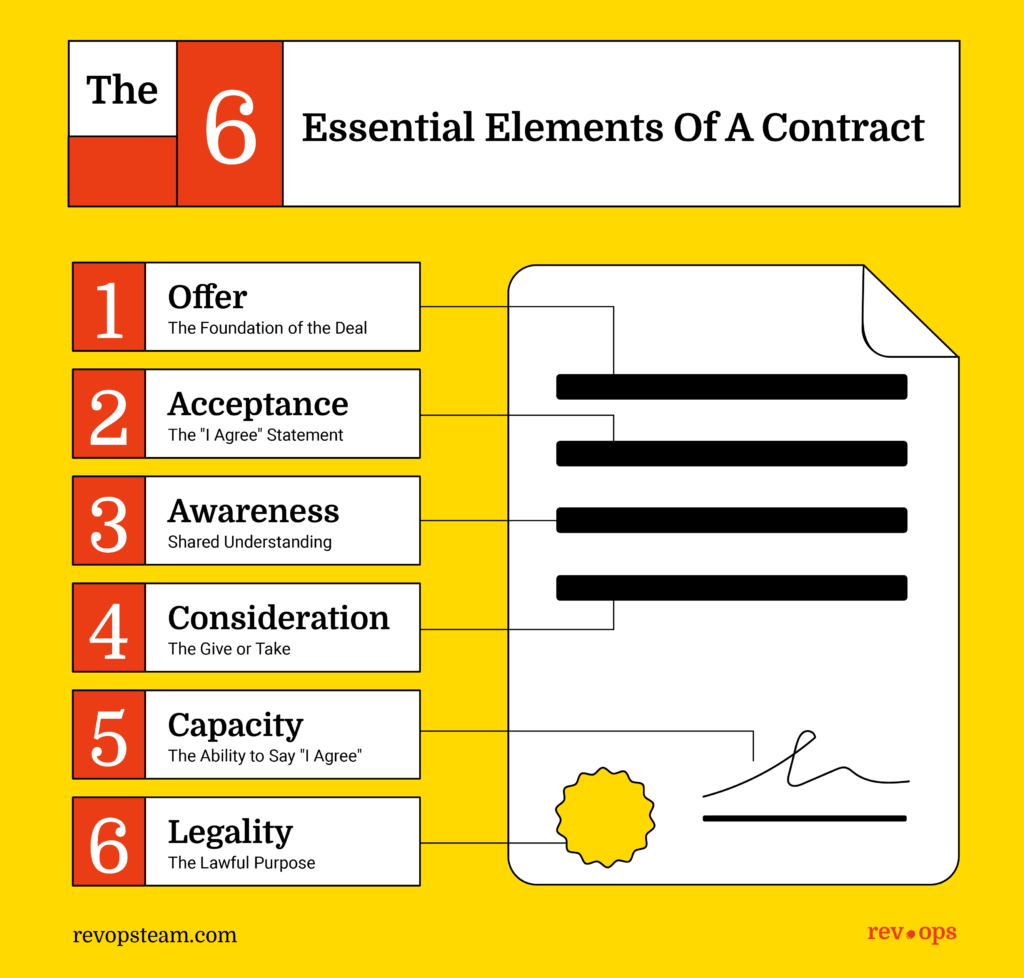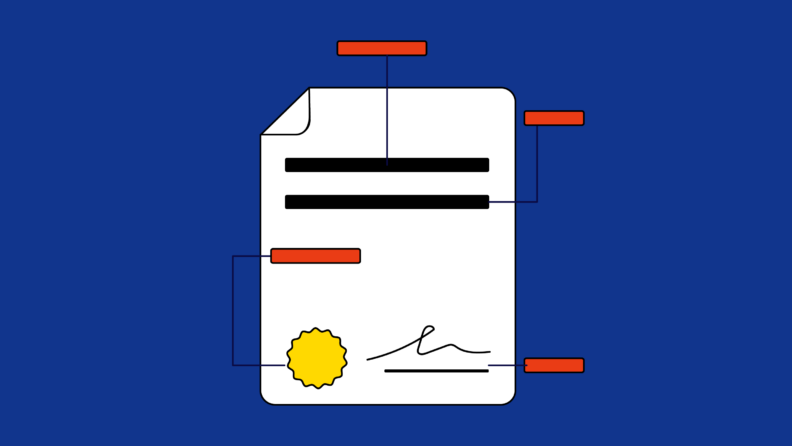Let’s go back to when you were six years old. You likely had few responsibilities or concerns, and the most binding agreement you could make would come in the form of a pinky promise. Back then, that pinky promise meant the world—but now, businesses need to follow a sequence of legal steps to ensure that promise is set in stone. Contract stone, that is.
Whether you're sealing a deal or reaching an arrangement, having a legally binding contract solidifies the commitments, rights, and conditions of all parties. Consider it as a formal promise that creates a sense of trust and security between the involved parties. Break that promise, and you’re likely to face some form of legal action or repurcussions.
In my career, I've had my fair share of experience drafting and signing contracts. No matter the type and complexity, a rock-solid contract should always include six basic elements: offer, acceptance, awareness, consideration, capacity, and legality. If any of these elements are missing, the contract won't stand up legally.
In this article, I’ll guide you through the crucial elements of a valid contract, explaining how they render both written and verbal agreements legally binding and enforceable in court.
What Is A Contract?
A contract is a legally binding agreement that outlines the obligations, rights, and penalties for breach between two or more parties. If a contract exists, it can be in writing or verbally agreed upon and plays a crucial role in ensuring each party fulfills their commitments and enjoys the benefits they are entitled to.
What Are The Essential Elements Of A Contract?
Jumping right into it, let’s take a deeper dive into the six essential elements of a contract. These are all important to understand in your contract management process.

1. Offer — The Foundation of the Deal
When it comes to making a legal contract, two essential ingredients are needed: an offer from one party and the acceptance of that offer by another. Picture it as a promise one person makes, saying, "I'll do this for you if you do that for me." Without an offer, there's no deal.
To be valid, an offer must be clear and definite. The person making the offer (the offeror) must communicate their intention to enter into an agreement with the other party (the offeree). If the offeree agrees to the terms of the offer, either explicitly or implicitly, then voila, mutual assent! You have a binding contract under the law.
Note that an offer should be more than just a casual statement, and should really be presented in the form of a legal document. For example, in the sale of goods if someone offers to sell a car for $500, and the offer is accepted, it forms a binding contract. But merely placing a "For Sale" sign on a car isn't an offer; it's an "invitation to treat" for potential buyers to make offers and, therefore, isn’t legally binding.
Offers can be tricky as they can be revoked or changed before acceptance. If the offeree proposes different terms (a counter-offer), the original offer is canceled, and new negotiations begin. Stay mindful of these possibilities when dealing with contracts and offers.
2. Acceptance — The "I Agree" Statement
Once a valid offer is on the table, it's time for the acceptance of the offer. Acceptance is when the offeree agrees to the specific terms of the offer, without changing them. It's like saying, "I agree, let's do it!"
Contract acceptance can be expressed (clearly stated) or implied (shown through actions). During this process, it's vital that communication stays open between the offeror and offeree, especially since things can get a bit tricky with counteroffers. If any party proposes new terms instead of accepting the original offer, it resets the process, and negotiations for a new deal begin.
There is also such thing as conditional acceptance, often referred to as a qualified acceptance, which happens when a person who has given an offer tells the person who made the offer that he or she will agree if there are some changes made to the terms and conditions, or in the event of something happening. Of course, final acceptance still requires mutuality from both parties.
3. Awareness — Shared Understanding
For any contract to be binding, both parties need to be fully aware of what they're getting into or "a meeting of the minds." This means:
- Both parties actively participate and agree to the contract.
- They know they're entering into a contract.
- They clearly and decisively establish they're agreeing to the deal.
- They consent to the contract's contents and willingly agree to its obligations.
If either party can prove that they didn't fully understand the terms of the contract due to duress, fraud, undue influence, or misrepresentation, the contract could be voided. So, it's essential to ensure both parties fully comprehend and agree to the terms before finalizing the contract.
What other legalities do you need to know when signing a contract? Find out what makes a contract null and void.
4. Consideration — The Give or Take
In contract law, consideration is what each party gives up or promises to do to make the contract official. This can include valuable things like money, goods, services, or property. For instance, in an employment contract, the employer's consideration is the job and payment, while the employee's consideration is the promise to work for the employer.
Consideration can also involve refraining from doing something a party has the right to do. For example, if someone asks you to stop smoking in your own home, that could be part of the consideration.
Remember, consideration isn't always about money; the courts generally don't evaluate its fairness. People are free to enter into contracts, even if the exchange seems one-sided. Of course, there are exceptions to this rule, like employee non-compete agreements, where the adequacy of consideration may be considered.
5. Capacity — The Ability to Say "I Agree"
Before entering into a contract, all parties involved should have the ability to understand its implications (or "legal capacity") and make informed decisions.
Knowingly contracting with someone lacking capacity can lead to legal repercussions. For instance, if a person signs a document while intoxicated or under undue influence, their capacity to contract might be questioned.
Moreover, if someone exploits the signer's incapacity, the courts will be less forgiving and may favor the affected party.
6. Legality — The Lawful Purpose
Every enforceable contract must have a clear and lawful object to ensure the agreement's validity and enforceability. The 'object' here refers to the purpose of the contract, such as buying or renting a house for specific activities like hosting events or gambling.
An object is considered unlawful if:
- It goes against existing laws.
- It is forbidden by law.
- It involves fraud or harm to property or individuals.
- It is immoral or against public policy.
- It involves criminal activities.
Remember, even if a contract starts out as lawful, it can become invalid if it later conflicts with new government regulations or other legal changes. So, it's always best to stay updated and ensure compliance throughout the contract's duration.
Contract Classification
All contracts can be classified into either of the three categories:
With Action
These contracts involve involve parties committing to specific actions or performances. One party agrees to do something in exchange for something else from the other party. For example, when you hire a plumber to fix your sink, an implied contract is formed, and you pay for the service provided.
Written Contract
A written contract is a legally binding agreement documented in writing. It clearly outlines the terms and conditions agreed upon by both parties and becomes enforceable once signed. Written contracts provide a clear record of the agreement, reducing the chances of misunderstandings or conflicts. Examples include sales contracts and land agreements.
Oral Contract
An oral contract is a verbal agreement without written documentation. Though they can be legally binding in some cases, enforcing them can be difficult due to the lack of concrete evidence or clear terms, plus they rely on trust and memory. Examples include borrowing a book from a friend or agreeing to meet someone at a specific time. It’s best to only enter oral contracts with a reasonable person.
More Articles
- The 17 Best Account Management Books to Master Client Journeys
- What is Sales Forecasting? Your Key to Informed Decisions
- What is CPQ: A Guide to ‘Configure, Price, Quote’ for RevOps Teams
- 10 Best RevOps Communities (Free & Paid) To Join In 2024
- 12 Best Upcoming Analytics Conferences To Spend Your L&D Budget
What Constitutes A Breach Of Contract?
A breach of contract happens when one party fails to fulfill their obligations or perform as specified in the contract without a valid reason. Essentially, it's a situation where one party hasn't upheld their end of the deal, leading to a violation of the agreed terms.
Contract breaches can be of different types, such as:
- Minor Breach: This occurs when an item or service isn't received by the agreed-upon due date. For example, if a seller delivers folders a day late for an important presentation, the buyer must still pay but can claim damages caused by the delay.
- Material Breach: This happens when a key element of a contract isn't fulfilled as agreed. For instance, the buyer has paid the seller for a rare item, but the seller suddenly decides not to sell.
- Actual Breach: This is when one party outright refuses to fulfill the contract's terms as originally agreed upon. For instance, a vendor either doesn't deliver a shipment or delivers the wrong stock after taking payment.
- Anticipatory Breach: This occurs when a party informs in advance that they will not be able to meet the contract's terms and obligations. For instance, the receiver says they won't be paying for a monthly service for a month but still expect the service.
Although not a criminal offense, a contract is meant to be honored unless all parties agree to change it. While the consequences for breaching the contract might be outlined within it, in most cases, resolving the breach may involve the breaching party fulfilling their original commitment.
Types Of Contracts In RevOps
Business contracts play a vital role in the RevOps domain, as they establish the terms, conditions, and commitments related to revenue generation and customer interactions.
- Sales Contracts: Outline terms of sales with customers, including products, pricing, and payment details.
- Subscription Contracts: Define subscription terms, renewals, and pricing for subscription-based products or services.
- Partner Agreements: Establish terms for revenue-sharing and collaboration with partners.
- Vendor Contracts: Outline terms for third-party vendors providing essential goods or services.
- Service Level Agreements (SLAs): Define service standards, response times, and issue resolution commitments.
- Non-Disclosure Agreements (NDAs): Protect sensitive information shared with customers, partners, or vendors.
- Renewal Contracts: Manage renewals and terms for recurring revenue models.
Automate Contract Management
Contract management can be admittedly messy, but I have good news: you can streamline the time-consuming contract process using advanced automated tools. Check out our Best Contract Management Software guide to narrow down options and find the perfect solution for your needs, or our article on what to look for in contract management software.
If you don't want to miss out on more amazing content from The RevOps Team, make sure to subscribe to our newsletter to get it all straight to your inbox.


